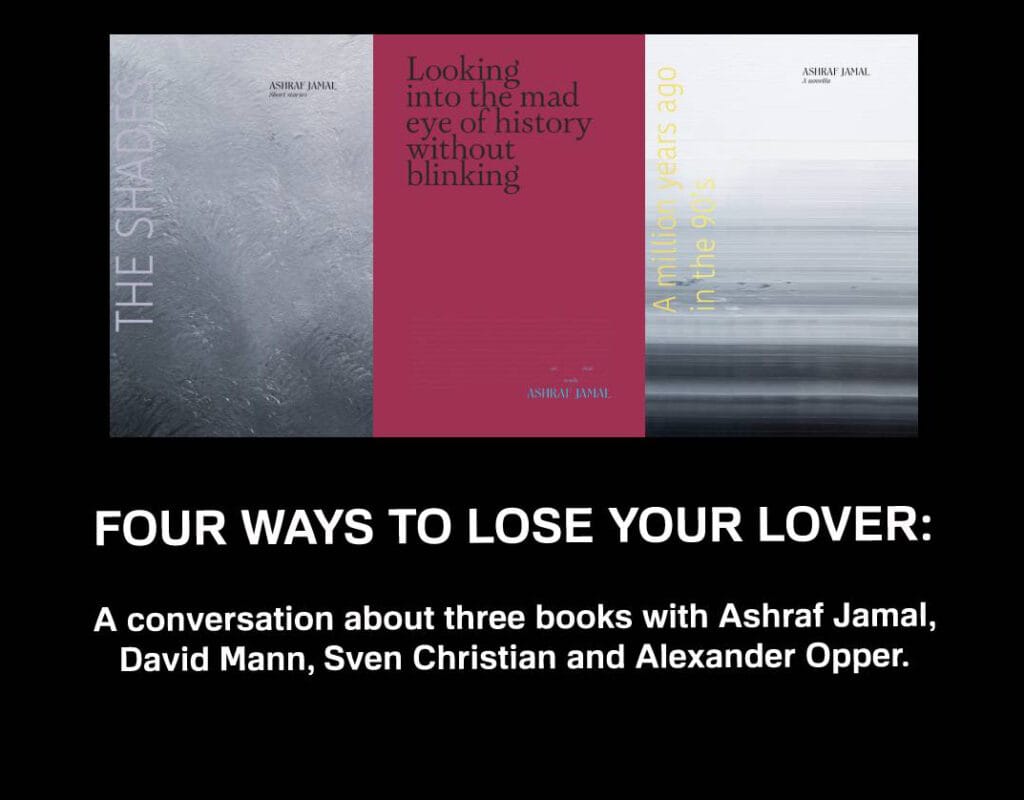BOOK LAUNCH | Four ways to lose your lover – Ashraf Jamal
Written by Danijela Cook
A few weeks ago the Blue House hosted the launch, in the form of a discussion, of three new editions written by Ashraf Jamal. Jamal was joined in conversation with three exceptional minds; Sven Christian, David Mann and Alexander Opper. On a bright autumnal afternoon, the quartet gathered around a table in the courtyard and in the company of many eager listeners, they began to share their thoughts.
Although Jamal mentioned that the name of the event was conceived quite spontaneously, I believe there could not be one more fitting – three books, four speakers, talk about loss and even more so about love. In saying this I do not mean to negate the vastness of the conversation.

Each speaker was given a book to discuss with the author. The format of the event allowed the audience to follow along through various chunks of thoughts, each of which prompted by Jamal’s books: A million years ago in the 90s, The Shades and Looking into the mad eye of history without blinking.
The talk was opened with an expression of gratitude towards Margot Muir, who encouraged and facilitated the release of these books. Muir along with Jamal and Sven Christian make up the team behind Mad Eye Books under which the works are published.
We commenced with Christian and Jamal diving into A million years ago in the 90s.
Somewhere between near death, grief and profound joy, this multi-layered novel is a dramatic intellectual passageway through relationship, restlessness and revival. Fearless and fiercely intelligent, a young Ashraf Jamal writes about scenes and ideas that are beautifully and brutally described, refreshingly palpable and sanguine, sometimes witty, and, more than occasionally, haunting.
Following this, David Mann engaged with the revival of The Shades:
The Shades won the Sanlam Literary Award in 2002.
How do we reconcile the apparently irreconcilable? This collection of short stories is a compelling trajectory of flight and fear, revenge and atonement, guilt and innocence. More fragment than story, more shade than colour, it is perceived by a young Ashraf Jamal as “variations on a story” that involves a mosaic of who and what we are and what we must become.
Finally, Alexander Opper discussed the collection of essays entitled Looking into the mad eye of history without blinking:
These exacting essays are for those who can tolerate reality and appreciate robust progressive ideas. A celebrated South African writer, Ashraf Jamal does not simply provoke precarious thought about an artwork, an ‘object of judgment’, he unearths the silences of deft essentialist ideologies hidden from sight, ignites careful optimism and dares us to consider – even reconsider – everything before us. In these sixteen essays, his is a formidable dance of provocation, candor, realism and slippage, and insight.
The conversation concluded with a captivating back and forth between audience members and the speakers. Our afternoon was spent considering our relationship with the world we live in – more so our relationship with the people we live in it with. Each speaker thoughtfully investigated the literary choices made by Jamal. The topics of suffering, loss, individualism, optimism and connectivity were sincerely fleshed out. I imagine each listener walked away with a little more trust in what can be created out of the absurd beauty of the world, having been reminded by Jamal that “the world inhabits us as much as we inhabit it”.
Each of these books, as well as Jamal’s previous collections of essays on art; Strange Cargo and In the World are available in store and on our website.
ASHRAF JAMAL is the Writer-Researcher for ArtBankSA, and a Research Associate in the Visual Identities in Art and Design Research Centre, University of Johannesburg. He is the co-author of Art in South Africa: The Future Present, and the co-editor of Indian Ocean studies: Social, Cultural, and Political Perspectives. Jamal is also the author of Predicaments of Culture in South Africa, Love Themes for the Wilderness, A million Years Ago in the Nineties, The Shades, In the World: Essays on Contemporary South African Art, Strange Cargo: Essays on Art, and the newly published Looking in the Mad Eye of History without Blinking.
DAVID MANN is a writer and editor from Johannesburg, South Africa. He currently works as the writer for The Centre for the Less Good Idea, an interdisciplinary incubator space for the arts. His short stories about art and performance have appeared in journals and publications including New Contrast, The Kalahari Review, The Thinker, AFREADA, Ons Klyntji, Imbiza Journal for African Writing, Botsotso, and Sunday Times Books.
SVEN CHRISTIAN is a writer, editor, and curator. He is currently employed as Curator of the Villa-Legodi Centre for Sculpture and Nirox Foundation. Recent editorial projects include Ashraf Jamal’s Strange Cargo: Essays on Art (2022), and the forthcoming first issue of FORM Journal, published by the Villa-Legodi Centre for Sculpture.
ALEXANDER OPPER completed an undergraduate degree in architecture at UCT in 1993. This was followed by a Master’s degree at the University of the Arts in Berlin (2001). Using his approach of ‘Undoing Architecture’ he has produced a large body of work catalysed by the schizophrenic im/possibilities of Johannesburg and other cities on the continent.Significant themes preoccupying Opper are those of line, border, territory, ownership and belonging. His critical spatial practice spans installation, photography, text-based work, lens-based media and drawing.In addition to his artistic practice Opper has, since 2007, been a full time member of faculty at UJ’s Faculty of Art Design and Architecture. Here he established and ran the university’s first ever Master’s in Architecture programme between 2010 and 2014. In his capacity as an academic, he regularly presents and publishes on the productive frictions between art and architecture.

